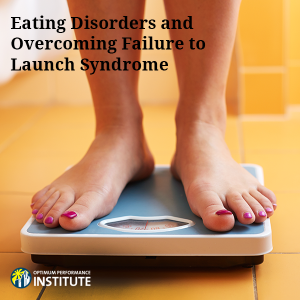
Eating Disorders and Overcoming Failure to Launch Syndrome
 Are you concerned that your young adult child may be suffering from an eating disorder? Although the majority of individuals battling eating disorders are female, between 5 and 15% are male, according to the National Association of Anorexia Nervosa and Associated Disorders. If your daughter or son appears to have disordered eating patterns or body image issues, they could be affected by anorexia nervosa, bulimia nervosa, binge eating disorder, or eating disorder NOS (not otherwise specified).
Are you concerned that your young adult child may be suffering from an eating disorder? Although the majority of individuals battling eating disorders are female, between 5 and 15% are male, according to the National Association of Anorexia Nervosa and Associated Disorders. If your daughter or son appears to have disordered eating patterns or body image issues, they could be affected by anorexia nervosa, bulimia nervosa, binge eating disorder, or eating disorder NOS (not otherwise specified).
Parents of young adults with eating disorders have a three-fold concern: they are concerned that the illness just may kill their child; they are concerned about the long-term health effects of the illness; and they are concerned about potential damage caused to their natural development.
The first concern, although crude, is backed by research. Eating disorders have the highest incidence of death among all mental illnesses. Cause of death may vary from a range of conditions like heart failure, malnutrition, or suicide. If your child has an eating disorder, getting them professional help from qualified clinicians could actually mean the difference between life and death.
Secondary to the staggering mortality rate of eating disorders are health problems that arise like osteoporosis, dehydration, tooth decay, peptic ulcers, high blood pressure, and Type II diabetes mellitus, among others. Mental health consequences include depression, of which 50% of eating disorder patients meet the criteria, in addition to anxiety disorders. The sooner an individual with disordered eating seeks treatment, the greater their chances of recovering from these devastating side effects.
The final concern for parents is how the disorder might affect their child’s development. Teens and adults who suffer from eating disorders may develop poor concentration which affects their abilities in school or work. The manner in which the condition weakens the body may cause them to sleep excessively either from physical or mental distress. All of these factors may contribute to failure to launch syndrome in your young adult child. The extenuating repercussions of the disorder make it hard for them to hold down a job, earn an income, and maintain living on their own. As a result, your child may end up back at home after depleting their own resources or being released from work or school.
Effective treatment approaches exist to help your child cope with negative life stress, alter their thought patterns about food and self-image, and learn how to commit to a healthy lifestyle in which food is used to fuel the body. Treatment of co-occuring disorders like depression is also essential. Individual and group therapy sessions, life coach meetings, and nutritional classes are all available at Optimum Performance Institute. We focus on treating young adults having trouble managing the transition into adulthood due to debilitating mental illnesses. Your child will have access to an individualized treatment program designed to complement their strengths and unique emotional disposition.
If you are worried that your young adult child may be experiencing failure to launch syndrome as a result of an eating disorder, seek out professional treatment right away.
At OPI, we offer compassionate, clinically sophisticated intensive residential help for young adult men and women who suffer from eating disorders, including genetic testing to determine the best course for medications, if needed. Rather than a sterile, hospital-like environment, we offer beautiful accommodations in luxury apartments just outside of Los Angeles. At OPI, we treat the individual, not the diagnosis. Our clinical team is made up of a diverse community of passionate, highly skilled individuals working together with you to help you find your joy and express it. For more information on OPI Intensive residential programs and our measures to help young adults with mental health and failure to launch issues, call us at (888) 814-5985 or click HERE to submit an online form. We’ll be in touch promptly.
Sources
http://www.anad.org/get-information/about-eating-disorders/eating-disorders-statistics/;
https://www.nationaleatingdisorders.org/health-consequences-eating-disorders
